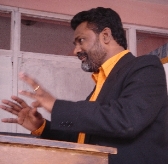 There is nothing called Hinduism. It is rather Hinduisms, because there isn’t one religion called ‘Hinduism’, but there is a multiplicity of religions within what we call Hinduism, ‘a parliament of religions’. It is a very complex system with many different and even contradictory belief systems within itself and hence I prefer ‘Hinduisms’. Rev. Sudhakar Mondithoka, Visiting Professor of 'Contemporary World Religions & Christian Apologetics' and 'Ethics' at SAIACS and Pastor of the English Congregation of Centenary Baptist Church, Secunderabad begins his series.
There is nothing called Hinduism. It is rather Hinduisms, because there isn’t one religion called ‘Hinduism’, but there is a multiplicity of religions within what we call Hinduism, ‘a parliament of religions’. It is a very complex system with many different and even contradictory belief systems within itself and hence I prefer ‘Hinduisms’. Rev. Sudhakar Mondithoka, Visiting Professor of 'Contemporary World Religions & Christian Apologetics' and 'Ethics' at SAIACS and Pastor of the English Congregation of Centenary Baptist Church, Secunderabad begins his series.
The Hindu context is a very complex context. The questions we get from a Hindu (in the context of religious discussion in general and evangelistic conversations in particular) depend on the kind of Hindu she or he is. It may not be an exaggeration to say that you can have as many forms of Hinduism as there are Hindus.
Contrasting Hinduism with Islam and Christianity, Heinrich von Stietencron says, "With Hinduism, I am afraid, things get more complex and involved. Not only does it have no church, but it also lacks any universally binding doctrines. It offers instead many possible varieties of religious thought, belief, and action; and as we will see, it largely defies our concept of religion.”[1]
Keith Yandell, in the Cambridge Dictionary of Philosophy defines Hinduism as "the group of religious and philosophical traditions of India that accept the doctrinal authority of the Vedas and Upanishads, comprising the schools of Mimamsa, Sankya-Yoga, Nya-Vaishesika, and Vedanta (six in number, with the connection within pairs of schools, indicated by hyphenation, based on historical and conceptual linkages).”[2]
In the same article Yandell says that "the closest Indian term to 'philosophy' is darsana (seeing); the goal of philosophy is typically taken to be not simply understanding, but enlightenment (moksha), which involves escape from the reincarnation cycle and from karma. All the orthodox schools formally accept the doctrines that the individual Atman beginninglessly transmigrates from body to body unless it attains enlightenment and that in each lifetime the Atman acts and hence accumulates consequences of its actions that will accrue to it in future lifetimes (karma), . . .” He further observes, "The classical Hindu philosopher typically in effect accepts some such proposition as the following: The Hindu scriptures contain the truth about the nature of what is ultimately real, about the nature of the human self, and about how to obtain the highest good.”[3]
You can tell that there can be a plurality of religious beliefs and philosophical traditions within Hinduism and that there might be some common beliefs among all of them. Reflecting a similar understanding Dayanand Bharati says this: "Already we have enough religion here in India, more than any other country in the world; even just in Hinduism alone which is rightly called a parliament of religions.”[4]
Another Indian author, Manasseh says that Hinduism, unlike other religions, is neither institutionalized, nor creed based, nor based on any single book and yet it survived mainly because of caste- bonds and rituals. May Indians prefer to call it a dharma (a way of life).”[5] We can say that Hinduism has its own unique features among the world religions. For example, there is no single person or figure in Hinduism who is considered to be the founder or authority figure, unlike other religions like Christianity, Islam, Buddhism, Jainism and so on. There is no single book that all Hindus follow, and there is no single set of doctrines that all Hindus subscribe to, unlike the people of other religions like Judaism, Christianity, Islam, etc. Hinduism is not an organized religion unlike other religions like Christianity, Islam, Judaism, and Sikhism. The reason we find Hinduism to be unique in so many ways is that it is not one religion, but a collection of religions or at least religious perspectives.
Commenting on the diversity of religious views within Hinduism, Stietencron says this: "Even within Hinduism, one person's sacred scripture is by no means necessarily someone else's. This individual may assign a minor role to a god whom another individual worships with deep devotion as the supreme divinity and Lord of the world. One man teaches that living creatures should never be harmed, while another man's altar drips with the blood of sacrificed goats and buffalos. One believer's Tantric practices are an abomination to others.”[6]
Quoting another source, Manasseh says, "As Dr. S. Radhakrishnan puts it "The Hindu tradition by its very breadth seems to be capable of accommodating varied religious conceptions.”[7] Stietencron suggests that we should understand Hinduism not as a religion but as a collection of religions. He further says, "Though actually different, they are nonetheless bound together by geography and history, as well as by the socioeconomic conditions and cultural frames of reference that developed in their common space. These are religions containing elements of shared traditions, and religions that have continually influenced each other down through the ages. . .”[8] I think we should accept the thesis that Hinduism is not a religion but a collections of religions, because within Hinduism there are different conceptions or ideas of God like monotheism, polytheism, pantheism, and henotheism.
Stephen E
vans says, "Hinduism is more a group of religious traditions than a single religious faith, since within Hinduism one can find both theistic and monistic views of God…”[9]Even the terms 'Hindu' and 'Hinduism' are not Indian terms and no Indian religion ever called itself 'Hinduism.' The meanings of these words have changed over a long period of time. It all goes back to the name of the great Indus River. Its old Sanskrit name was Sindhu and the Greek name was Indos and we owe our words India' and Indians' to this Greek name. The Persians in their language called the same river Hindu and this word, as in Sanskrit indicated the land through which the river flows.
The plural of this geographical name stood for the people who lived there, the Hindus, the 'people of the Indus' or the people of India,' the Indians. So, originally the word 'Hindu' appeared as a geographical term and once the Persian king Darius I extended his empire to the banks of the Indus, Hindus, the inhabitants of the land of the Indus (the Indians) were incorporated into the multination Persian state. From that time the Persians and other Persian-speaking people lumped all Indians together as 'Hindus.'
Later on the Arabs also called India 'Al Hind.'The shift in the meaning of this word began much later, took place very gradually, and was finally completed by the Europeans. When Persian speaking Muslims from Afghanistan and Central Asia invaded India, first around 1000 AD and then after 1200 AD, they subjugated large parts of India, but they could convert only a fraction of the people to Islam. Then the Muslims used the term 'Hindu' to characterize the Indians who would not convert to Islam and who were not Buddhists. Thus, in the Islamic context the word 'Hindu' contained a distinct religious element.
Finally, in the sixteenth century the merchants and Christian missionaries that came from Europe got to know this expression for the majority of non-Muslims in India and for the first time they separated the terms Indian' and 'Hindu,' applying the former to the secular sphere and the latter to religion and then they derived the word 'Hinduism' from it.”[10]
To be continued…
and the World Religions, Ed. Hans Kung(New York: Doubleday & Company, 1986), 137.
(Cambridge: Cambridge University Press, 1999), 383.
[3] Ibid., 383-384.
[4] Dayanand Bharati, Living Water and Indian Bowl (Delhi: ISPCK, 2001), 3.
Biblical Studies & Research, 2001), 5.
[6] Stietencron, 138-139.
1973), 236.
[8] Stietencron, 143.
[9] C. Stephen Evans, 54.






Pastor it nice to know that you are heading this ministry ,you have taught me in truth@life and at apologetics club pondicherry.
Its enlightening think to know the plurality that exists in hinduism and singularity that it took on in recent times.I was going through vivekananda and aurobindo recently and though they both are pantheists they don’t hold on to the same things either and i have see the aurobindo ashram people and their lifestyle quite different from people of the ramakrishna math.The point is even with in the same school there are different interpretations which make it even more wider,complex.
personally the difficulty comes in sharing with hindus as they no one person believes the same thing.But God gives wisdom through teachers like you and your ministry ahs greatly helped me in understanding world religions and world views.
This is a very interesting article of Hinduisms. Please address Dr. Manasseh instead Manasseh.
Thanks,
David.